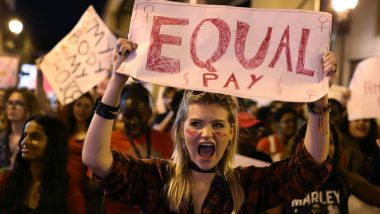While the fundamental human rights let everyone enjoy equal rights regardless of their gender, women have always had to ask for theirs and most of the times, fight for them. Standing up for themselves, women have also learnt to be there for each other in times of need. High drama brewed in Association of Malayalam Movie Artists (AMMA) earlier this week when four female members from Women In Cinema Collective (WCC) resigned from the committee in retaliation to the association's stand to reinstate Dileep, an accused in the alleged sexual assault case of a Malayalam actress in February 2017. He was behind bars for over 80 days and is presently out on bail. Rima Kallingal, Remya Nambeesan, Geethu Mohandas and the victim send their resignations after the actors' body decided to take the actor back into the fold.
Women have to endure inequality, domestic violence, sexual abuse, sexism, disparity in the gender-biased society. But trampled under the patriarchy, women have always had to ask for their rights rather than being given. While recent uprise of movements like #MeToo and #TimesUp helped in highlighting how widespread the issue is, there is yet a lot to be done to raise a generation that believes in equal rights.

In the meanwhile, we can take a look at instances from history where women stood together on being wrongfully denied something. They have fought, protested, made sacrifices, changed preconceived notions of the society, highlighted pressing issues by taking a united stance. Many of the rights that we women enjoy today is because of the brave deeds of some of the most courageous women in the world. We have compiled a list of such incidents when women paved way for themselves by standing up for each.
Black at The Golden Globes 2018

The #MeToo campaign grew far and wide with a largescale impact, bringing sexual predators out in the open. After multiple women accused Hollywood filmmaker Harvey Weinstein of sexual misconduct, women across the world came out in open naming and shaming their harassers. Following which the Golden Globes 2018 became a platform to showcase protest against sexual misconduct in the workplace with dozens of celebrities wearing black.
In support of the Time's Up movement and to showcase solidarity with victims of sexual assault and harassment, women came wearing dressed in black colour. Many men also wore Times' Up badges on their black suits. This a prime example of female empowerment which helped bring notice to an important issue faced by women across the globe.
Leaving Work Before Time

To showcase protest against the gender pay gap, women in Iceland started leaving their workplaces at sharp 2:38 pm in 2016. According to unions and women's organisations, in every eight-hour day shift, women are mostly working without pay from 2:38 pm. Hence, women employees left offices, factories, schools, hospitals or other workplaces, thus marking 14 per cent less of their working time. Thousands of women would then gather in central Austurvöllur square to protest against gender pay gap by raising slogans and holding placards.
Following the protest, Iceland made it illegal to pay men more than women for the same work in Iceland. Bjarni Benediktsson, the former prime minister of Iceland on International Women's Day 2017 announced that the country wants to eradicate the gender pay gap by 2022. Iceland had witnessed similar protests in 2005, 2008 and 1975. The law was widely appreciated not just in the country, but also outside Iceland. It is a prime example of how women stood for themselves and with each other to bring a necessary law into force.
Nangeli-The Woman Who Cut Off Her Breasts

It is the sacrifice of a lower caste woman named Nangeli in a Kerala village that abolished breast tax in Travancore. In the 19th century, the prince of the erstwhile state of Travancore enforced 'breast tax' (Mulakkaram) in which all low caste women had to pay tax if they dare cover their breasts. Shamefully, the breast tax was calculated on the size of the breast, the bigger the size, higher the fee. But, Nangeli, a lower caste woman did not follow the ridiculous policy despite being warned. The village officers started frequently coming to her house asking for the tax money.
Frustrated by the harassment, one day when they came, she chopped off her breasts and threw it in front of them in a banana leaf. She bled to death, after that. Her husband overcome by grief jumped into the pyre of his wife committing suicide. This incident led to widespread movements against the breast tax system until it was completely annulled in Travancore. Her house and the place she lived is today remembered as Mulachiparambu (land of the breasted woman)
Kathrine Switzer-First Woman Who Ran the Boston Marathon

Kathrine Switzer is the woman who changed the common belief that only men can run the marathon. More than fifty years ago, Switzer altered the notion by participating in the Boston Marathon. In 1967, Kathrine Switzer's marathon became historic because she was the first woman to complete the all-male race as an official entrant. Switzer decided to run the race after her coach insisted that women were too fragile for long-distance running. She had registered as 'K.V. Switzer' which helped her hide her gender.
When a race official tried to stop her in the middle of the run, her boyfriend, Thomas Miller intervened. She, however, completed the race, creating history. Women were finally officially allowed to enter the competition in 1972. Switzer has today competed in more than 30 marathons and is the founder of 261 Fearless, a running club for women. The name comes from the number she wore in 1967.
(The above story first appeared on LatestLY on Jun 29, 2018 11:03 AM IST. For more news and updates on politics, world, sports, entertainment and lifestyle, log on to our website latestly.com).













 Quickly
Quickly


